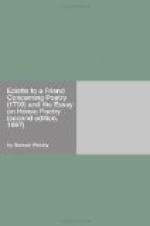are thought to be made use of in the Christian Religion;
for Example, the Throne and Temple of God in the Revelations,
and the Description of the New Jerusalem, with all
its Gates and Foundations of Sapphires and Emeralds,
and that lovely Scheme of Trees and Rivers, worthy
a Paradise: All this, I say, will scarcely be
granted literal, and consequently must be all an Allegory;
alluding partly to the Old Jewish Church and Temple,
partly to Ezekiel’s Visionary Representation
and Prophetical Paradise. Nor can it, I think,
be justly reckoned more criminal, where we have any
great instructive Example, which has been real matter
of Fact, to expatiate thereon; adding suitable and
proper Circumstances and Colours to the whole, especially
when the History it self is but succinctly Related,
and the Heads of things only left us. And this
some great Man have thought was the Method of the
Holy Pen-man himself, whoever he were, in that lovely
antient Poem of Job; which, that ’t was at the
bottom a real History, few but Atheists deny; and
yet ’tis thought some Circumstances might be
amplified in the account we have left us, particularly
the long Speeches between that Great Man and his Friends;
tho’ the main hinges of the Relation, his Person,
Character, and Losses, the malice of the Devil, the
behaviour of his Wife and Friends, nay even the Substance
of their Discourses, as well as of that between God
and him, and the wonderful Turn of his Affairs soon
after: All this might, and did, truly happen.
Or, if any amplification should be here deny’d,
does not the Divine however every day, Paraphrase
and Expatiate upon the Words of his Text, inverting
their Method as he sees occasion, and yet is still
thought unblameable. All the difference is, that
he delivers what’s probable, as only probable;
whereas the Nature of Poetry requires, that such probable
Amplifications as these, be wrought into the main
Action, in such a manner, as if they had really happen’d;
and without this, a Man might Ryme long enough, but
ne’er cou’d make a Poem, any more than
this would have been one, had I begun with, Abraham
begat Isaac, and so tagg’d on to the end of all
the fourteen Generations, much as Nonnus has done
with St. John, and yet often miss’d his Sence
too, as Heinsius judges.
But enough of Fable, and of those who would either
reduce all Heroic Poetry unto it, or absolutely banish
it thence.
Next the Fable of Epics, the Poem is to be considered;
which, after Bossu, is the other part of its general
Nature, and shews the manner of handling it, comprehending
Thoughts, Expressions and Verses; of which there need
not much be said, since they are obvious to every Reader.
The Thoughts must be clear and just, and noble, and
the Diction or Expression suited to them. The
chief Difficulty, as Rapin observes, is to keep up
the Sublime, which Virgil has done admirably, even
in the meanest Subjects; and which Aristotle thinks
may be best done by the judicious use of Metaphors.
There ought to meet, according to him, Proportion
in the Design, Justness in the Thoughts, and Exactness
in the Expression, to constitute an accomplish’d
Heroic Poem; and the great Art of Thought and Expression
lies in this, that they be natural and proper without
Meanness, and sublime without a vitious Swelling and
Affectation.




